#alan schom
Text
A look at three Fouché biographies
Over the past few months I've read three English-language biographies on Fouché: Joseph Fouché: Portrait of a Politician, by Stefan Zweig; Fouché: Unprincipled Patriot, by Hubert Cole; and Medusa's Head: The Rise and Survival of Joseph Fouché, Inventor of the Modern Police State, by Rand Mirante. These are a great example of how dramatically interpretations of a historical figure can vary from one historian to another (see also the difference between Alan Schom's interpretation of Napoleon vs. that of Andrew Roberts). And also a great example of why it’s a good idea to read multiple biographies on the same figure, to gain a more well-rounded perspective, instead of simply accepting/adopting that of the first biographer you read.
Zweig is a colorful writer and his biography is highly entertaining—he actually had me laughing out loud a few times—but his depictions of Fouché are so hilariously sinister and malignant throughout that at times it almost feels like a caricature. Zweig also utilizes the least amount of primary source material out of the three biographers--hardly any, actually--and so much of what he writes in regard to Fouché's motivations and thoughts come across as pure speculation or projection, but are always stated very matter-of-factly. Zweig presents a Fouché who chafes at the smallness of the roles he is given, driven by "unflinching selfishness." "When in power," Zweig writes, "he does not work for the State, does not work for the Directory or for Napoleon, but for himself." Aside from raw ambition, Zweig attributes most of Fouché’s actions to his sheer delight in engaging in intrigue for the sake of intrigue, an interpretation that seems to come straight out of Napoleon’s venting on St. Helena: “Intrigue was to Fouché a necessary of life. He intrigued at all times, in all places, in all ways, and with all persons. Nothing ever came to light, but he was found to have had a hand in it. He made it his sole business to look out for something that he might be meddling with. His mania was to wish to be concerned with everything.” Overall, Zweig’s book is worth reading, but out of the three English-language Fouché biographies, it’d be ranked third on my list.
Hubert Cole’s interpretation of Fouché is as different from Zweig’s as night is from day. The key word in Cole’s title is “Patriot,” and Cole’s central point is that Fouché, at each point in his career, was doing what he believed was in the best interests of France, even if that meant negotiating for peace with Britain behind Napoleon’s back, or pushing Napoleon towards a divorce and remarriage for the sake of shoring up the Bonaparte dynasty, or even (repeatedly) abandoning one master to serve another. This is the second one of Cole’s biographies I’ve read, and as most of you following me already know, I loved his dual biography on Joachim and Caroline Murat, the deceptively named The Betrayers, which is actually a very sympathetic look at the Murat couple. Cole is no fan of Napoleon and doesn’t really attempt to hide it, and maybe it’s because of this that he feels inclined to look deeper at the motivations and actions of those who ended up in opposition to Napoleon at various points (and who have therefore been demonized in history books accordingly). Cole draws heavily on primary sources, from letters and memoirs of Fouché’s contemporaries, to Fouché’s police bulletins (quoted at length throughout) to argue that “It is possible… that he was a sincere and moderately successful patriot. It is not uncommon in France for egoists to be hailed as patriots, and patriots condemned as traitors.” Far from the sinister, cold-blooded figure that haunts Zweig’s biography, or the “universally distrusted, feared, and hated” social pariah of Mirante’s, Cole's Fouché is charming, a welcome figure in the drawing rooms of Paris society, with a preference for making friends rather than enemies; nevertheless Cole does not deny that Fouché could also be ruthless, ambitious, and cunning. Cole also uses numerous accounts regarding Fouché by British, German, and Russian contemporaries, “in the belief that their prejudices, if national, are less personal.” Out of these three biographies, this one was my personal favorite, as I think it provides a more well-rounded picture of Fouché as a human being.
The primary focus of Mirante’s book is Fouché’s administration of the Ministry of Police, and the biography goes into great detail about the operations of the police in Napoleonic France, its vast network of informants, subversion of the press, surveillance of emigrés, and steady stream of information flowing in from all quarters. Fouché emphasized to his subordinates how one small detail or event could be “of great interest in the general order of things by its connections with related matters of which you are scarcely aware.” Like Cole, Mirante quotes frequently from Fouché’s police bulletins, as well as from memoirs of the era (though most of the excerpts are those hostile to Fouché). Unlike Cole, Mirante’s Fouché is driven not by any higher patriotism, but—especially after his humiliating flight from France in 1810—by a deep and abiding hatred of Napoleon, towards whose final destruction Fouché is willing to go to any length. Mirante provides more detail on Fouché’s exile and final years than either Zweig or Cole, one interesting aspect of which is the warm welcome Fouché received in Trieste from Elisa Bonaparte, who had been driven from power in Tuscany largely through Fouché’s machinations with Murat in 1814. Mirante ends the book with a critical look at Fouché’s dubious, ghostwritten “memoirs,” the credibility of which he is far more suspicious than Cole, who accepts the argument of French historian Louis Madelin that they are “largely authentic and accurate.” Mirante, on the other hand, is not convinced, and concludes that the memoirs are “highly assailable, at least quasi-spurious, and shrouded in controversy and deceit.” Mirante ends by drawing parallels between Fouché’s policing methods and those of the Gestapo and NKVD in the 20th century.
Overall I enjoyed all three of these for different reasons, and taken together they offer a more complete picture of Fouché. I haven’t gotten around to reading any French-language biographies on Fouché yet, but I do have a couple works on him by Emmanuel de Waresquiel that are definitely on my to-read list.
#Joseph Fouché#Napoleon#Napoleon Bonaparte#Napoleonic#history#19th century#books#biographies#French Revolution
60 notes
·
View notes
Text
*BOOK REVIEW*
Alright. This is gonna be a long review so bear with me. If you want the short version, here you go: it's great and you should read it! If you want the long version, see below :)
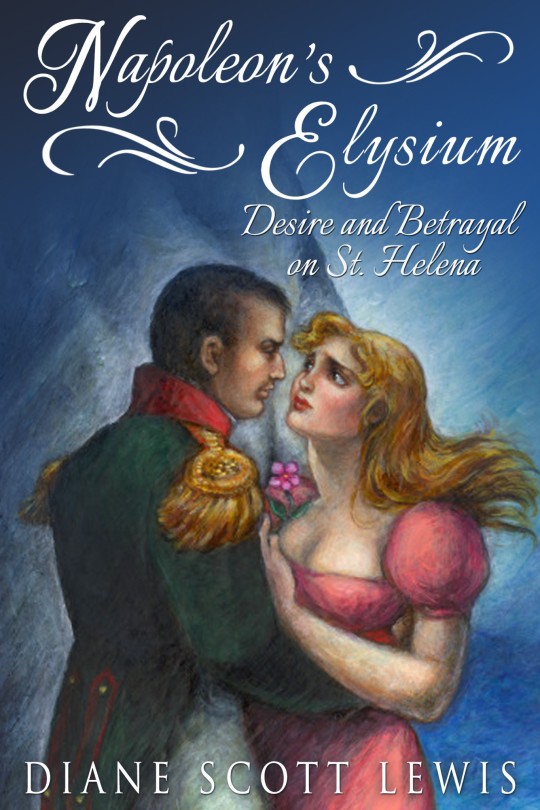
So I had my misgivings about the summary before reading. But I'm glad I gave it a chance. Never judge a book by its... summary? Because the cover is lovely! ( @suburbanbeatnik aka @trashpoppaea )
Here's a bit of summary from me, but I don't want to go too far and give away anything: So the story is about a young woman named Amelie who is the daughter of Napoleon's chef. She is a kitchen maid that also does some gardening of herbs and things. She is 19 at the beginning of the story when they all first arrive on the island of exile, St. Helena. She is an aspiring writer of erotic stories, despite being a virgin. She wants Napoleon to take notice of her and begins singing in hopes that he will hear. He does! He proposes that she do lessons and she begins her friendship with Napoleon. Over the course of the book, the friendship becomes more and she longs to be his mistress. People try to dissuade the relationship, especially her father, who knows there is something inappropriate in their supposed innocent friendship. Count Montholon and his wife become very jealous that a kitchen maid is taking all of Napoleon's attention away from them. Even Napoleon, although he desires Amelie, respects her and wants to "keep her pure" despite all the rumors that are flying around the island about them. There are also secret plots of escape and maybe even someone attempting to poison the Emperor. I'll stop there so I don't ruin everything ;)
Personal connections: I think I connect to this book and Amelie is particular because I too was once a teenage girl trying to write a book about things I hadn't yet experienced. 🫣 Throughout the book she mentions what her characters are doing and it parallels her changing relationship with Napoleon. That's a very real thing. When your book is based off of real people and you are mad at them, the characters reflect that. I thought it was a nice touch.
Historical aspects: Amazing! Let me tell you, the moment that the desk was mentioned, I cried like the sentimental silly goose that I am. (I have an obsession with Napoleon's desk from St. Helena, if you don't know lol.) Also it's mentioned how big and spacious Napoleon's tub is and I thought that was a realistic detail to point out. As someone who has bathed in one of his marble tubs, it's so real. Like I thought a tub was a tub until I experienced that one. (Yeah I'm kinda obsessed with the tub, too.) I looked up what his tub there looked like and I'll put a picture at the end, but it's a copper tub. Another thing I noticed, was mention of the sugar cone. It could have just said Amelie got some sugar, the end. But back then that's how sugar was sold and I thought it was such a nice touch. I felt like I was really there, experiencing the desk, the tub, the sugar cone, the island, the time period. No one would notice if she hadn't included these details, but I certainly noticed them being there and appreciate the research.
Characters: And I thought it was impossible to hate anyone more than Sir Hudson Lowe on that forsaken rock! Well this book has me hating Montholon and especially his wife, Albine. This book goes with the poison theory that was getting me shot down in my review of Alan Schom's book. I'm just saying I'm not 100% convinced against it still. 🤷���♀️ (Maybe I'm on board since I spent some of my childhood believing that I was being poisoned while suffering a mysterious stomach ailment?) But also, where are Gourgaud and Las Cases? They were not in the book, nor was Betsy Balcombe? I suspect that Amelie was like an alternate, older substitute for her based on the friendship that she and Napoleon shared before the sexual aspects of the book took place.
The end: Ugh I want so badly to make some comments on that but I will refrain! If you've read it, message me and I'll say what I want to say about it if you want.
Anyways I highly recommend it! I was a little embarrassed by the romance aspects at first, as I've never read a book like that before 😳 my husband was laughing at me lol but here's the picture of the copper tub I promised!
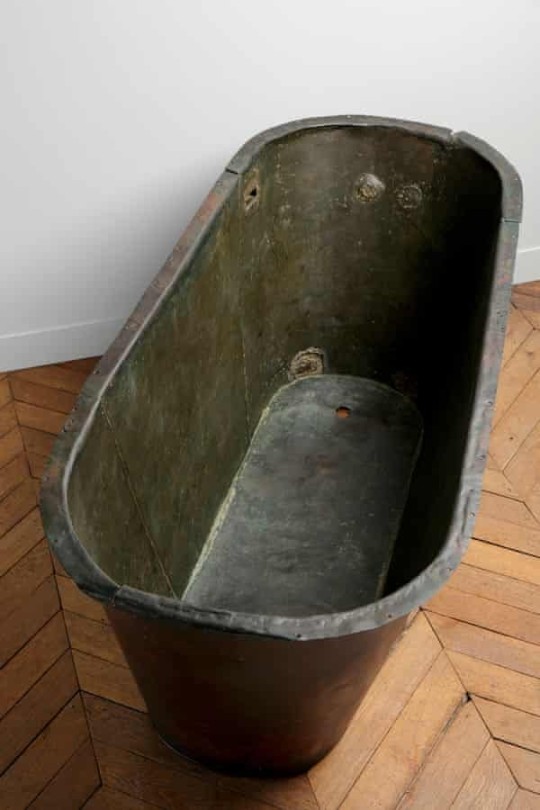
#napoleon#napoleon bonaparte#napoleon's elysium#desire and betrayal on st helena#book review#romance#historical fiction
32 notes
·
View notes
Note
What did Alan Schom do?
his biography on Napoleon is atrocious and should be avoided unless, of course, you're looking for an example of what not to do
#riddled with inaccuracies#the quasi-freudian psycho-analyzing is unfortunate#etc etc#ask#reply#anon#napoleonic
2 notes
·
View notes
Text
"On the Prince Imperial's tomb lies a wreath of white immortelles given by Queen Victoria, and a bunch of purple heather recently laid there by Princess Beatrice. It had been gathered on the common by the Princess when she was the guest of the Empress Eugénie."
- Jane T. Stoddart, The Life of the Empress Eugenie, published 1906
Immortelles, incidentally, are named as the favorite flower of Hortense de Beauharnais (stepdaughter and sister-in-law of Napoleon Bonaparte, mother of Napoleon III, grandmother of the Prince Imperial) in Alan Strauss-Schom's biography of Napoleon III, The Shadow Emperor. Immortelles were also placed at the foot of Napoleon III's coffin, and used to decorate the church gate for his funeral, according to The Graphic newspaper's account of events.
#prince imperial#napoleon iv#bonaparte family#queen victoria#princess beatrice#princess beatrice of battenberg#empress eugenie#hortense de beauharnais#second french empire#louis-napoleon bonaparte#napoleon iii
0 notes
Text
One of the funniest things I’ve ever read is in Alan Schom’s biography of Napoleon when he unironically says something along the lines of “Napoleon was a brutal tyrant who outlawed all criticism of his regime but in glorious liberty loving England people were free to criticize Napoleon as much as they liked”
It’s like that Cold War joke about how in the US and USSR you are equally free to criticize American foreign policy only it’s not a joke
Schom isn’t even English so he doesn’t actually have an excuse to be doing the “plucky England against the ogre Bonaparte” schtick
#Napoleonic wars#history#Alan schom#england preventing the vast majority of her population from exercising the franchise and enslaving millions of foreigners#while bitching about French tyranny
1 note
·
View note
Photo

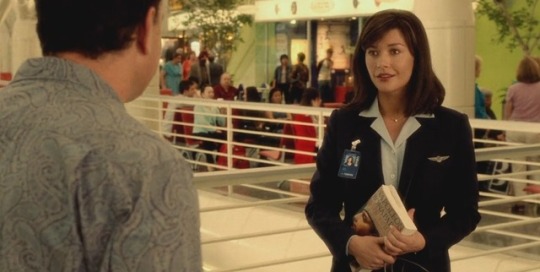
Napoleon Bonaparte by Alan Schom
The Terminal
12 notes
·
View notes
Photo
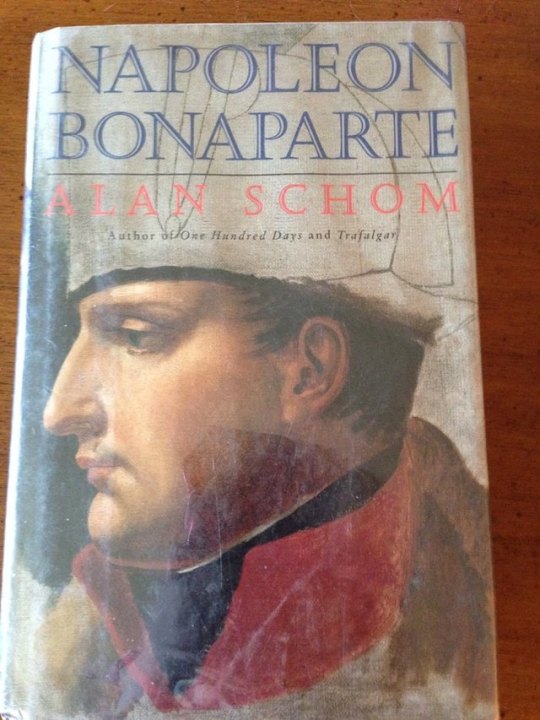
I’VE JUST STARTED READING THIS AND I LOVE IT
1 note
·
View note
Note
Hi I was wondering if you had any recommendations of a biography of Napoleon? I wanted to read a good book but I don't know which is good. Thanks😊
If you are in the mood to tackle a big-ish book, the biography by Adam Zamoyski is a good over-view. I will also throw in Andrew Roberts biography, though I have not gotten to read that one yet (on the list!).
It really depends on what you are looking for. If you want a general all around biography, those two you could start with, both huge books though that may be daunting. If you want a more smallish biography, the biography by Manuel Komroff I have a soft spot for. Napoleon, An Intimate Biography by Vincent Cronin is also a good book.
If you’re looking for a more personal side of Napoleon, that is a different set of books. You may have to go older, like real older, to find these. There hasn’t been too many recent books on Napoleon in this aspect. Octave Aubrey has written several books on the personal side of Napoleon. R.F Delderfield has written some very good books on Napoleon’s more personal side also and his family.
You can always read up on his marriages, more written on Josephine, to find a more intimate history about him.
I would stay away from the Alan Schom biography.
12 notes
·
View notes
Text
((I got a Napoleon Bonaparte book and I’m on chapter 2 page 29. I can’t put it down!!! I love Napoleon!))
0 notes
Text
7/31/18
WRITER OF THE WEEK Korean-American Chang-Rae Lee has written on subjects ranging from the struggle between cultural assimilation and sense of self in Native Speaker to the search for hope in dystopia in On Such a Full Sea.
BOOK SALE The summer book sale has ended. Thank you to everyone who bought, sold, or set up books on behalf of the Friends. Please look for our next sale in the Fall.
AUGUST EVENTS Next Wednesday the 8th at 11 AM, toddlers can make their very own play dough. Older children can make bookmarks out of paper clips on the 9th at 11 AM, join us to experiment with making music on the following Wednesday the 15th also at 11 AM, create their own personalized pencils on Wednesday the 22nd at 2 PM, and finally on the last Wednesday of August make a sign letting everyone know when they’re doing their homework. Teens headed back to school can make magnets to decorate their lockers on Thursday the 23rd at 2 PM. Families can enjoy Movie Night on Thursday the 16th and our Family Book Club (featuring Jinx by Sage Blackwood and the chance to build your own terrarium) on the 30th. For adults we have Social Hour on the 8th, a watermelon-y craft on the 9th, and a Coloring Circle on the 16th. Drop-in computer help will be available on Tuesdays the 7th and 28th from 6 – 7 PM and Saturdays the 4th and 18th from 11 AM – 12 PM.
REGULAR PROGRAMS Music and Movement for toddlers is Tuesday at 10 AM. Stories and Songs, for ages 2 – 4, will return next Saturday at 10:30 AM. Drop-in computer help will be this Saturday the 4th from 11 AM – 12 PM. Call the library or check online for all of the details on all of our upcoming events.
JUST ARRIVED Dip into history this week with one of our new books. We have recent biographies of Napoleon III (Alan Strauss-Schom’s The Shadow Emperor and French writer George Sand (by Martine Reid,) and a look at the life of James I (The King’s Assassin by Benjamin Woolley.) Examine the global changes caused by Alexander the Great with Before and After Alexander by Richard A. Billows. You can visit the world of America’s merchant fleets in Steven Ujifusa’s Barons of the Sea, or travel the dry lands of Earth’s deserts with William Atkins in The Immeasurable World. Finally, pick up a memoir detailing the lives of the family behind a popular dessert with Allie Rowbottom’s Jell-O Girls.
We welcome your QUESTIONS, COMMENTS, CONCERNS, PURCHASE REQUESTS, AND PROGRAMMING IDEAS. Contact us at 312 Washington Street, [email protected], 315-393-4325, or through any of our social media sites (you can do a search for Ogdensburg Public Library or find the links on our website, ogdlib.org.)
REGULAR HOURS are 9 AM to 8 PM on Monday, Tuesday, and Thursday, 9 AM to 5 PM on Wednesday and Friday, and 9 AM – 3 PM on Saturday. We look forward to hearing from you and seeing you at your library!
0 notes
Text
Napoleon Bonaparte book comparison essay
'nap nap / liveliness / soldiery / Asprey / Schom\n shew Topic:\n\nThe equality of cardinal harbors consecrated to the spiritspan of pile nap: The bear witness of catnap nap by Robert Asprey and cat sleep nap: A spiritedness by Alan Schom.\n\nEssay Questions:\n\nHow secret do The devise of cat sleep nap by Robert Asprey and short sleep nap: A Life by Alan Schom reveal the smell and the someoneality of nap Banaparte? How does Robert Asprey portray catnap Banaparte? Why is cat sleep Bonaparte: A Life by Alan Schom considered to be a biographical written report?\n\nThesis dictation:\n\nThe works of Robert Asprey and Alan Schom atomic number 18 discussed in cost of their reflection of catnaps register; these argon deuce of the numerous solely save rattling interesting examples or it is even break away to say var.s of snoozes feign into the worlds taradiddle in general and into Frances archives in particular.\n\n \n catnaps futurity rise.\n\n pile Bonap arte earmark comparison demonstrate\n\nHistory is the version of the past events\n\nthat bulk wee indomitable to agree upon\n\n1. inlet\n\nHistory has incessantly been a truly refuteional source cause a spile of arguments among the representatives of un desire historic encampments. It goes with forth saying that history is non l superstar(prenominal) the past of humanity, simply as well its rising(a) for it gives examples and lays the path for the future generations. But what would history be without leg residueary commonwealth who created it with their let b atomic number 18 hand? These people unremarkably become obscure and genuinely controversial, too. cardinalness of these historic every(prenominal) toldy evidential people is catnap Bonaparte. This name by itself arouses mixed feelings in the magnetic cores of versatile historical chase. Some people think of him as of a army thaumaturge and idolisation his strategical talents and a great hea rt; an some new(prenominal)(prenominal)s consider him to be a grim psyche not able to determine comme il faut strategic armament decisions and sympathize with other people. This is no surprise for whatever experienced indorser because the more writers one reads the more disparate opinions he observes. objectiveness is usu ally missed among the numerous facts and artifacts. sleep Bonaparte is a figure which is receivedly attractive for the writers referable to its actuality until nowadays. Here, the works of Robert Asprey and Alan Schom are discussed in footing of their reflection of sleeps life- period; these are dickens of the numerous scarcely nevertheless very interesting examples or it is even bring out to say versions of cat sleeps invasion into the worlds history in general and into Frances history in particular\n\n2. The break of nap Bonaparte by Robert Asprey\n\nThe organise of sleep Bonaparte by Robert Asprey is one of the two volumes of short s leeps life that examines the early old age of the new-fangled Bonaparte and his formation in the semipolitical and phalanx machine sphere from his parentage in 1769 until the haughty year of 1805 and the fall uponment at Austerlitz. The germ of the nurse creation a condition U.S. Marine police chief and a military historian take cares to be very stimulate by everything that forty winks Bonaparte performed inwardly his military actions. He shows copious generosity towards sleep and is explaining the temper of naps actions through the disposition of the time he was born in. He says: The child arrived at an awkward time in the young and almost penurious couples life[1]. forty winkss military victories and defeats seem to bewitch the designer are analyzed from the catamenia of view of snoozes fealty to his empire, to his country which is very seldom observed. short sleeps system is sh hold as the moreover way to achieve his personal information of what the world should be like.\n\nThe military talents of the emperor are revealed with the bright Brumaire coup of 1799, the naval battle rancid Toulon in July 1795, other military events and give up with the victory at Austerlitz. Due to causes fertile admiration of sleep Bonaparte the adept of objectivity is wholly lost by him. He overemphasizes short sleeps commencement military propose trustworthyized in the Egyptian-Syrian campaigns of 1798 and does not totally explain all the expenses and reasonless victims during the atomic number 63an campaign. He offers out the factor of Napoleons swelled head constantly glide slope into play and make Napoleons strategy blunders. Napoleons arguable expeditions to China and India and others are not reflected in the way they should divergence this space asinine and make the bulk more of a ode than a deep analysis.\n\n3. Napoleon Bonaparte: A Life by Alan Schom\n\nThis declare is another biographical sketch of the life of Napoleon Bonaparte. It overly describes Napoleons childhood young person and maturity on the background of his victories and fiascos. It touches Napoleons in person life and political and military manipulations. In comparison to Aspreys biography this book is al to spend a pennyher imbrued with the sense of Napoleons poor homework and seems to question his keen abilities at all. It affect with throughout the book starting exclusively objectively: Nabulio (Napoleon) would go to the Royal troops School of Brienne-le-Chateau, where he would learn what to umpteen Corsicans was still an knotty language, French, along with history, geography, mathematics, and the other courses infallible preliminary entering the Ecole Militaire of genus Paris[2]. This description gives all the premises for Napoleons future rise. save, closer to the end of the book and peculiarly plot of land analyzing variant battles the author seems to disuse Napoleons personal qualities and strategic abilities. The emperor is shown as an ambitious destroyer, like a bear, making terrible stochasticity anywhere he goes. Napoleons historical fabulosity mentioned in the introduction is completely disclaimed by the book. exclusively Napoleons strategy-plans some of which resulted in victories are considered by the author to be Napoleons personal impetuses that did not take into neb the people who were sanctified to him, the consequences and therefore had zero point to do with real strategy. What especially concerns the author is the Napoleons attitude towards his soldiers. It is especially observed in the description of the Egyptian campaign afterwards which the army was ravaged and weak. Schom shows that all this events could have been prevented through proper strategy plan and exploration. Napoleon is shown to be way worsened than Genghis Khan and a limited person. It does not leave the reader the opportunity to form his own perception of Napoleon Bonapartes life and achiev ements, only when tunes to the jaundiced sense of smell upon all of the events. It does not interact with the reader.\n\n4. Conclusion. These two books present a completely different attitude towards Napoleon Bonapartes abilities as a military genius and a person who changed the life of Europe and France. Robert Asprey shows admiration to the military conduct of Napoleon, while Alan Schom shows so often negation of Napoleons achievements. Both of them seem to lack real objectivity so desperately required by historical biographies. Napoleons military bodily process certainly possesses a bias image with all its victories and fiascos, nevertheless it is important not only to synopsis his mistakes but also to reveal all the positive aspects of his decisions. The books contradict each other and need to be less subjective. Nevertheless reading them together may look at the reader to a deeper understanding of Napoleons life and creating his own opinion, which would not be the afo rementioned(prenominal) with the authors but may contain certain aspects without obtruding any subjectiveness so catastrophic for history.If you want to get a bountiful essay, order it on our website:
Looking for a place to buy a cheap paper online? Buy Paper Cheap - Premium quality cheap essays and affordable papers online. Buy cheap, high quality papers to impress your professors and pass your exams. Do it online right now! '
0 notes
Note
Do you recommend some napoleon books?
So far my favorites are Napoleon Bonaparte by Alan Schom, although it is kind of biased and a little outdated. The author goes with the theory that Napoleon was poisoned on St. Helena but there's still a lot of good information. Napoleon, A Life by Andrew Roberts is unbiased and more modern. Most people seem to prefer this one. I've seen it quoted and mentioned in several other books and sources. If you're into podcasts, there's a great one by J. David Markham and Cameron Reilly which I'm still listening to.
9 notes
·
View notes
Note
Theres suddenly a lot of napoleon hate in the tag and idk what to do.. I’m interested in him and all but he did a lot of rly bad shit. I don want to pester you but do you know a way i can like.. come to terms woth those thoughts because its unhealthy to just rip from a hyperfixation
ah yeah that comes and goes. I don’t track, or go into, the Napoleon tags for that reason.
I’ve addressed this before to another anon a year or so ago, maybe more, but at the end of the day you have to understand that Napoleon was human. He did bad things, he did good things. He could be a dick, he could be warm and generous. Because he is a multi-facsted human being living, and ruling, in a complex time. (All times are complex, but you know what I mean.) (Also, there are times when you can’t really apply modern expectations of behavior or morality to the past. Or, I mean, you can. But it won’t get you very far. I think tumblr struggles with this, sometimes.)
I don’t have an answer for how you should reconcile the contradictory life he lead. That is up to you to figure out. Sometimes you just have to sit with, and acknowledge, the bad. Because it isn’t going away.
But also don’t become all consumed on one side (he’s the anti-christ/evil/the worst thing ever) or the other (saint who can do no wrong). Finding a balanced, nuanced understanding of him is key.
And to that end, I recommend getting off Tumblr. Tumblr does not like nuance or context. It does not like understanding the world people are born into, the events that impacted their lives, the fact that they are human and so have deep flaws - as we all do.
What I do recommend? Reading lots. Avoid Alan Schom and Phillip Dwyer (my two nemesis, though they are unaware of this). I only point you to biographies as a means to provide you with an overview of his life. But all biographers are flawed, all have their biases. And biography as a historical format is ... well I’ve strong views on it. But if you’re keying in on one person for fixation reasons, it’s a good starting point. Zamoyski’s alright. I have some critiques of his work but he’s as fine as any for a starting point. Steven Englund’s Napoleon: A Political Life is probably the best I’ve read.
But once you’re done with that, read what original documents you can (memoirs, diaries, letters, accounts, newspapers), but read them critically. Know that memoirists all had a spin. Letters were written with an understanding that they could be read publicly - if at least to other family members. The concept of privacy was different at that time.
Also, very importantly, read broadly about the life and times of the late 18th and early 19th centuries. Read about the French Revolution, Napoleon was 20 when it began and it had a profound impact on him. Read about culture and society at the time - in France, in Corsica, Italy, the UK. Read about religion, about science and literature of the late 18th and early 19th century. Napoleon was not a religious man but his Catholic childhood informed, if subconsciously, many of his world views. Especially his understand of a woman’s place in the world. It’s a deeply Mediterranean Catholic understanding. Read about friendship and the homo-social nature of Napoleonic relationships in France (Napoleonic Friendship is great for this). Read about the revival of the classics (which, when covering the French Revolution, should be addressed).
It’s one of those things, that to come to understand someone. To reconcile their incredible bad with their incredible good, you need to know the world they were operating in. The life they led. The information they had to hand. The relationships that informed and influenced them.
E.g.: Napoleon and Josephine fought famously over money. Why? Josephine had a compulsive spending habit that I think is a bit of a response to the Revolution and her experiences therein. Napoleon watched his father fritter away what little money the family had gambling, drinking, whoring, ill-thought out business ventures etc. (his mother, according to one apocryphal story, used to send him down to the docks to spy on his father and report back how much he lost). He also went through incredible poverty in his early 20s as the sole bread-winner for his entire family. Des Mazis has some moving memories about this time and how messed up Napoleon was about feeling like he was failing everyone.
These two people have strong responses to money because of the things they’ve lived through. Entirely understandable responses. But they are responses that are in conflict, so of course they fought over it.
Context matters.
Some of the things he did are not going to be comfortable to think about. And that’s ok. That’s part of studying history. Witnessing events and actions that are uncomfortable, that are horrible. But also, as a historian, your role is to understand. By all means look at the decisions he made and say: that was a terrible thing to do. But also look at decisions he made that were good. Like, I don’t know how else to put this than to say: he was complex, he made mistakes, he was cruel in some of his policies, he was also capable of great kindness and generosity and goodness of spirit. He did France great good and he did her great harm. As all rulers do to their countries.
He did the people he loved great harm and great good. He hurt them and helped them. As we all do to the people in our lives that we care about.
I wish you the best on this.
My only truly dear, and earnest advice is: get off Tumblr. Do not take your history from this website. Do your own research. Form your own opinions.
Thank you for the kind ask!
43 notes
·
View notes
Text
*Book report!*
Napoleon Bonaparte by Alan Schom
I read this book as a teenager and felt like I didn't retain or fully understand a lot of it, so I read it again as I'm beginning my new Napoleon research. It's a very good book, although I feel the author isn't completely unbiased throughout. But the thing that stands out to me the most, is Schom's unwavering opinion on Napoleon's death was that he was murdered by Montholon. I've always been on the fence about whether he was poisoned or if it was stomach cancer. He obviously had stomach troubles all his life, but there were mysterious deaths on St. Helena leading up to his own and Montholon definitely had motives.
What do YOU think? I'd like to hear your opinions please!
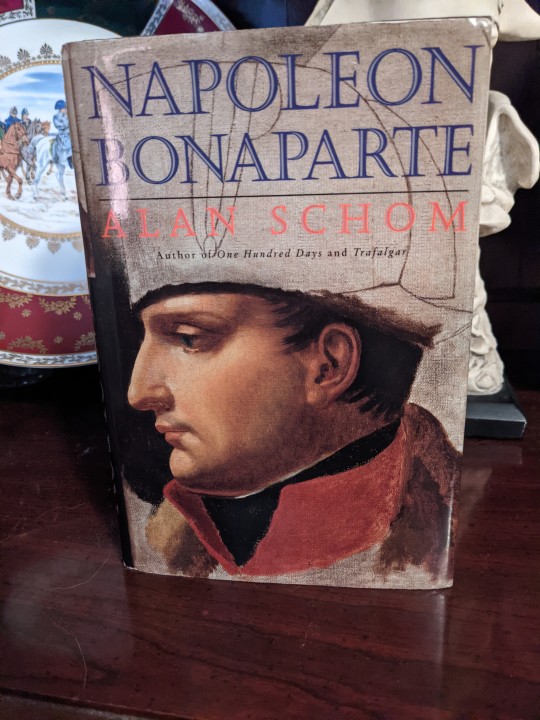
35 notes
·
View notes
Text
*book report!*
Napoleon by Andrew Roberts
So to me, reading a book (especially when it takes me a long time to read it) isn't just about the book. The memories of other events going on in my life while I'm reading tend to stick with me when thinking back on the book. For example, I started reading this particular book in the magical city of New Orleans, in Le Pavilion, the hotel with the Napoleon suite, which we moved into a few days after starting the book. I was able to read about Napoleon signing the Louisiana Purchase while taking a bath in the very tub Napoleon signed it in! The same week, I was able to see his desk from St. Helena, one of the death masks, and many other wonderful things. And this book will always take me back to New Orleans. Anyways, onto the book itself...
Andrew Roberts had a more modern and certainly unbiased take on Napoleon than the last book I read (Alan Schom's book on Napoleon). He added a lot of things, mostly in footnotes, linking history to the present, saying what certain places looked like now, if they were still there and so on. Maybe some day I can travel and use these notes to get into perspective. To me, the ending felt rushed, however. Waterloo, exile to St. Helena, and even Napoleon's death seemed to go by in a blur. I know the end of his life was not near as exciting as his rise to power or campaigns and such but it's something I'd like to know more about in depth. As a historian, I think Roberts did well to leave out emotion I'm writing about Napoleon's death, but as a reader, I needed it. The epilogue was wonderfully factual and straight forward, telling what happened to which person after Napoleon's exile and/or death. It was a rush of facts but it definitely served its purpose. Best book on Napoleon that I have read - so far.
And yes, I had to recycle this picture. That tub... 😍
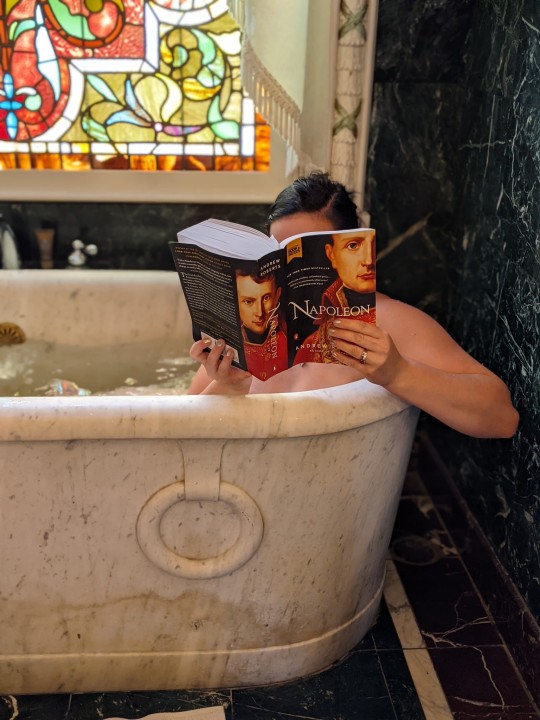
32 notes
·
View notes
Note
Hello! Do you have some recommended books I could read about Napoleon? Thank you!
Oh hi! I struggle with most anglo Napoleonic biographers as they tend to swerve in extreme directions regarding the subject matter (he’s either Evil or a Blameless Hero). Obviously, such reductions of a figure serve no one any good. I’ve thoughts on why this plays out - and thoughts on biography as a historical genre in general - but they’re for another time.
-
My personal favourite is Napoleon: A political life by Steven Englund although if you’re very new to Napoleon it might not be a good one to start on.
I haven’t read it yet, but Tim Clayton’s new-ish book, This Dark Business, looks interesting provided he’s nuanced in his approach - it’s focus is on the british government’s attempts to undermine Napoleon’s regime. I can’t speak to it with authority though.
Michael Broer’s Napoleon: Soldier of Destiny is a good one on Napoleon’s early years - the follow up, Napoleon: Spirit of the Age, less so. His Europe under Napoleon and Napoleonic Empire in Italy are also good but obviously much more about the empire versus him personally. If you have access to university library systems and academic journals his articles are usually good.
Robert Asprey’s two works on Napoleon are good. They provide a descent overview of his life and are pretty balanced.
As always, I recommend reading source material when and where possible. Although having a grounding in the historiography of the subject area is important since all memoirs and letter collections etc. should be read with a critical eye. Memoirs and early histories are, for the most part, all political and trying to sell you something. (Especially the ghost-written memoirs.) Newspapers and bulletins are a fun to read to see how people understood adn positioned things at a contemporary level. Letter collections, if you can get to them, are great.
Meneval’s memoirs aren’t bad; I like O’Meara’s from the exile years but a word of caution on O’Meara being one of those trying to sell you something (esp. regarding his treatment of Hudson Lowe); Bertrand’s, if you can get it, is good.
If you’re feeling pedantic and have French Jean Tulard’s Napoléon au jour le jour, 1769-1821 is fun. It’s what it says on the tin - Napoleon’s day to day life as much as we can piece together.
Avoid my nemesis, Philips Dwyer. Also avoid Alan Schom. Utter hacks.
-
I hope this helps at least get you started! There’s a lot out there with Napoleon and much of it is bad. I wish you the best and thank you for the ask :D
17 notes
·
View notes